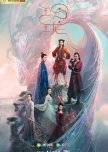
Man made goddess.
This fantasy drama is set in Sichuan, a world that is being torn apart by internal strife, corruption and disillusionment after the people are abandoned by their goddess. The young ruler Yuan Yi sets out to restore faith, peace and prosperity to his land by seeking the return of the goddess. This brings him to a remote village that is occupied by a tribe whose sacred duty is to contain the deadly earth fires from erupting and engulfing their world. There he encounters Linglong, a young girl with inexplicable powers and her father Huotu Xin. They are semi-outcasts in the village as Linglong's mother was an outsider who disappears as mysteriously as she appeared. Is Linglong the key to bringing back the goddess to Sichuan?I have to give top marks for how mythically gorgeous this fantasy world looks - especially the fabulous flying fish ships. This drama's premise around this magical fantasy land and its man made goddess is very interesting and I really enjoy how the world building takes place slowly as the mysteries of the past and the origins of the goddess are revealed. The problem is that the plot peaks at that point, meanders around before limping to an unimpressive and dissatisfying ending.
I really enjoyed Yuan Hong's performance as Linglong's father in this drama and find it to be the drama's most memorable and enjoyable relationship. His heart warming, comical rapport with Zhao Jinmai's Linglong regularly had me grinning away and made me continue even after the plot lost momentum. This is one of the best portrayed father-daughter relationships I have seen in c-drama. I am so glad I watched this because I really needed to wipe the (not good) images I had of Yuan Hong after Rebel Princess. He is an incredible and smoking hot actor and I wish the drama was written around his character Huotu Xin, who is much more interesting than the titular character Linglong. That is one of my main gripes - the titular character Linglong is not that interesting and her relationship with Yuan Yi is sweet but does not make a lasting impression. Sadly the China market is idol-focused and there is limited room for actors like Yuan Hong who are ageing out of lead roles.
I love realistically written, opaque and intriguing characters with conflicting agendas, which is how many of the other main characters are written. That makes them so much more interesting than the OTP that I care a lot more about them and am dismayed at how callously they are dealt with. Even Li Sha and Yin Xiao are much more interesting both in terms of their personalities and abilities than the OTP. Not only was I rooting for both Wu Yuan and Yin Zhuang at the same time, I was also rooting for Wei Shengyan and Huotu Xin at the same time! It is incredible that this drama manages to resolve such win-win triangles in a way that manages to disappoint someone who is rooting for both angles. Wei Shengyan is a smart and curiously likeable protagonist who suddenly does stupid, self destructive things to force the plot towards the ending the writers wanted. I don't want to spoil the end so I will just leave it at lots of stuff happens, there are many sacrifices but Sichuan is not necessarily a better place and I don't care that much about the winners.
I enjoyed many aspects of this fantasy drama and can recommend it as a decent filler drama to watch with low expectations. I rate it 7.0.
Questa recensione ti è stata utile?

The Legend of Shen Li
62 persone hanno trovato utile questa recensione
Tale as old as time.
The Legend of Shen Li is a highly entertaining xianxia with a terrific starting hook. Injured while fleeing an unwanted marriage, Shen Li crashes into the mortal realm in her innate phoenix form. Mistaken for a chicken, she is rescued and healed by Xing Yun, a sickly ginseng salesman. Never in my wildest dreams did I think I would be shipping an unseemly attachment between a haughty chicken and a weak but insolent mortal. Their hilarious interactions and witty repartee had me grinning like a fool. This has to be the first CP that I got invested in before the FL properly meets the ML.While I find Legend of Shen Li quite enjoyable, it is a tale as old as time and I am not just making fun of Xingzhi's age. This kind of forbidden love story between a lonely, crusty old god and a much younger one is the staple of this genre. This one is written more as a character story so there is little plot movement until the second half of the drama. The plot itself leans heavily on well known xianxia tropes with a modern, role reversal approach. What makes it special is that it is well executed, the main CP has scorching chemistry, it is anchored by a stellar cast and tongue-in-cheek dialogue has deep and heart tugging undertones. This is an excellent entry-level xianxia that will thrill and delight newcomers to the genre the most. While die hard fans of the genre will certainly enjoy the fresh take on old themes, they may find the plot predictable after the early arcs.
For me, the mortal realm is always the most interesting xianxia arc and this is no exception. It is at the same time the most disappointing arc in terms of missed opportunities. It is too short and half the time Shen Li is an angry CGI bird. Shen Li's feelings for Xing Yun developed so quickly I felt shortchanged on the how and the why she fell in love. Worse, their story is overshadowed by the two utterly heart wrenching ill-fated love stories. To some extent, the narrative coasts on the residual heat from Princess Agents and assumes the audience is already invested in the main CP. The issue is viewers who did not watch that may not feel the chemistry between them. The arc ends so abruptly that it barely dawns upon me that Shen Li's affections could be one-sided. She very high-handedly falls for a helpless mortal and doesn't give him any say in the matter because she knew it to be transitory. This is quite sad and complex and it is a pity the narrative dealt with it too cursorily.
As someone hungering for closure from Princess Agents, I am stoked to report that the chemistry between Lin Gengxin and Zhao Liying burns as hot as ever. This drama is generous to a fault in fusing passionate love scenes with humor and moving romantic moments. I find myself chuckling at how hot and flustered Shen Li gets by Xingzhi's shameless flirting until the veiled pathos behind Xingzhi's careless words hits me and makes me tear up. Both characters are designed to recycle the strengths of their previous collaboration without taking much risks. Notably, there is no extra dimension or complexity to Zhao Liying's role or portrayal. She once again delivers in spades what she does best from the brilliant, combative glitter in her eyes to her signature awesomely bad-ass fight scenes. I would have liked to see more facets to King Bicang beyond the fierce warrior with a deadpan expression who is casually cruel to CGI animals. There is more scope for Lin Gengxin to shine as Xingzhi is a contradiction; the most powerful and yet the most powerless being in the three realms. I was impressed by Lin Gengxin's heart wrenching and nuanced portrayal of this so very alone ancient being who will crack a joke to stop your heart from breaking for him.
As a couple, Shen Li and Xingzhi are too perfect for each other - their world view is largely aligned and besides the one bombastic obstacle of an existential crisis for the realms, there is no real conflict in their relationship. While they experience some acutely angsty moments, they are all short lived. Most of the intense and lingering agony in this xianxia actually comes from the three devastating side love stories. Both characters are fully realised beings that don't grow much. That is left to the likes of Furong who is my favorite character in the first half of the narrative and the character that shows the most growth overall. His limelight in the second half is stolen by Lady Jin who is by far my favorite character and one who saves the draggy second half of the show for me. I find the villains quite boring and archetypal and those roles are also the least well acted. Even though Shen Li and Xingzhi come together in a moving and masterful ending climax, the finale is too much of something I have seen many times before. I did not enjoy the extended ending fight sequences and the heavy handed CGI.
Despite the unoriginal plot, this is an excellent character driven story. I was invested in many characters beyond the leads - Furong, Youlan, Qing Ye, Feng Lai, Mofang, Lady Jin and the indignant Cluck Cluck. The dialogue uses comedy brilliantly as a gateway to the profound in highlighting complex, deep and at times tragic existential themes. I enjoyed the conversation about how if we can work together against evil, we may no longer need gods to be our babysitters. I also felt a shiver of fear in this age of AI at the idea that as creators, one day we will become an existential threat to our creation. Overall a very enjoyable and highly recommended funny and intelligent xianxia that I am happy to rate 8.5/10.0.
Questa recensione ti è stata utile?
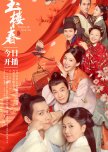
Women hold up half the sky.
Song of Youth is a historical Chinese soap opera that pays tribute to 红楼梦 Hongloumeng (Dream of the Red Chamber), widely regarded as China's greatest novel. Fans of the novel will immediately recognize that the backstory of an aristocratic family in decline and the multiple character blueprints that are based on this vernacular classic. Uniquely, this narrative plucks out the all-consuming, angsty, tragically epic love triangle that forms the core of the novel and focuses instead on broader, often less appreciated themes. The love triangle is still there but it is been muted to the extent that it is only peeks out towards the end.Lin Shaochun, a talented actress from a performing troupe marries Sun Yulou, the youngest scion of the noble Sun family. With her innate resourcefulness and the support of her husband, she becomes indispensable to his initially disapproving family by ably resolving all their internal and external conflicts and challenges. Bai Lu as always delivers a very enjoyable performance as the supportive and loving wife of Sun Yulou and the clever, thoughtful and femininely authoritative Sun family fixer. Even though I think Wang Yizhe has a lot of potential as an actor, he struggled to get into character and I didn't see much spark between him and Bai Lu. But it doesn't matter because albeit with some challenges, their arc is short and it is ultimately a rather pedestrian love match. After that the narrative explores more complicated and more poignant relationships where the couples have limited ability to make their own choices. Very much like Court Lady, Lin Shaochun is just a tour guide through the social structures, culture, relationships, vanities and daily life details of feudal 18th century China. Thankfully unlike Court Lady, Bai Lu's portrayal of the role as occasionally ruthless and not overly preachy and righteous makes Lin Shaochun very likeable if too infallible to be that interesting.
What stands out about this drama is that very much like Hongloumeng, it celebrates the contribution of women to society - Mao Zedong was far from the first to acknowledge that women hold up half the sky. True to the novel, the drama is very female centric - Lin Shaochun is the main protagonist and in a fitting role reversal the ML Sun Yulou is just a prop; an attractive, decorative vase. Even the best antagonists are formidable and devious women. In fact, most of the male characters in the drama are rather weak and not that intelligent - Sun Yulou only pulls himself together to be worthy of Lin Shaochun, his oldest brother is a foolish gold digger's wet dream, his second brother is the most capable of the lot and his third brother is a henpecked wastrel. All of them become better, more successful men thanks to their smart, determined and capable wives. I find both the eldest and (especially) the second brothers' stories to be far more interesting than that of the main CP. Unfortunately the second brother's story fizzles out in the middle and ends in a slightly disappointing way. Nonetheless, Yao Dizu is by far the most multi-faceted and refreshing character in the drama, more so than Lin Shaochun. She is also the only character that gets to be the author of her own story. If Lin Shaochun were written to be more of a bystander and less of the person who always saves the day, this would be a much better drama. She always wins by the same modus operandi so by the second or third arc, I was on to her and the "twists" become predictable.
The other problem with this drama is that it doesn't seem to be written in one voice or tone and thus gives the impression that it doesn't know what it wants to be. I think it is intended to be a satire or parody of bourgeois upper society during Ming Dynasty. Unfortunately in parts the humor is quite slapstick when it comes to Lamu Yangzi and some of Jin Chen's scenes because that matches the kind of humor they do best. Bai Lu and the rest of the cast however, are better suited towards more subtle, satirical humor and when the writing tries for something in between, it comes across as forced and half the time it misses the mark. That said, there are some really good laugh out loud moments but overall the wit and humor is hit or miss. The rhythm of the screenplay is particularly awkward at the beginning but more enjoyable from the middle episodes. After the four brothers' stories, the recycling of themes around the fallout from arranged marriages gets old and the final arcs flatline - I saw the final end twist a mile away so the end was predictable and anti-climatic.
This gorgeous production was clearly shot with meticulous attention to detail from the sets to the authenticity of the costumes, make up and the cultural details. The only lapse is perhaps the fact that the classic Cantonese opera Legend of the Purple Hairpin is sung in Mandarin and not in its original language (this was one of my grandma's favorite operas, she used to play the Liza Wang/Adam Cheng recording all the time). Overall a high quality production that is an enjoyable light watch even though it falls well short of Hongloumeng in terms of panoramic impression, breadth of social commentary and lasting impact. This is fun enough for me to rate this a 7.5.
Questa recensione ti è stata utile?
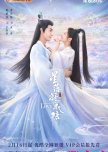
Flower Power.
The Starry Love is a divine comedy packed with romance, sisterhood, friendship, adventure, mystical powers, and gut-busting laugh-out-loud moments. It takes dead aim at the tired, cliche-ridden xianxia formula. I was sold on both the drama and the female lead the moment she asks the most relevant question; after thousands of years, does the equipment still work? I laughed so hard that I fell off my treadmill. Be warned; it can be life-endangering to eat junk food or sip wine while watching this hilarious xianxia spoof.This story rehashes a well-known plot about mixed-up brides where two sisters end up with each other's intended. Born under auspicious omens, the elder, virtuous, and good-natured Princess Qingkui is engaged to the aloof and righteous Shaodian Youqin, Sky prince and protector of the realm. The ill-omened, defiant, and mischievous younger Princess Yetan is to be married to the ominous Void realm, where the unfavored, scheming, and ruthless third prince, Chaofeng plots against his brothers to be the next Void Tyrant. Through a comedy of errors, Yetan ends up in the Sky realm where she turns the world of the pompous Youqin upside down while Qingkui stupefies the nefarious Chaofeng with her goodness. Both couples hilariously discover that opposites attract and two wrongs make a right. All too soon they discover that they are twin flowers born from a sacred tree that can unleash chaos on the four realms. Can their flower power prevail over destiny or will their stories only be remembered by the starry skies?
The more familiar you are with common xianxia tropes, the funnier this drama is. The plot unfolds along recognizable lines, gobsmacking you with unexpected twists along the way. The sisters truly love and support each other and the friendships are genuine and tested by hardship and sacrifice. While there is a healthy dose of the genre-defining angst that made my eyes burn with tears, it is usually short-lived, turning into humor in the blink of an eye. This is a very self-aware drama that pokes fun at the absurdity of tired tropes by acknowledging that even invincible immortals fear death, that the Sky realm is a very boring place and most of the eye candy lives in the Void realm. While it is a humorous fresh take on the genre, the underlying messages about good and evil are all too familiar and there is not much substance to the story.
It is undeniable that the sis-mance and romances are the highlights of this drama. Each sister finds in her mate all the qualities she loves best in her sister! The sisters are loyal to each other almost ahead of their lovers and their men get it and accept that there are more important things than love. Newcomer Chen Muchi gave me palpitations with his sexy and charismatic portrayal of the duplicitous and manipulative Chaofeng. It was a joy to watch Qingkui awaken that spark of conscience that sets him on the right path without losing his air of devil-may-care wickedness. I was initially less impressed with Chen Xingxu's cliched and stiff portrayal of Youqin's stony indifference. But the way Youqin comes alive once that facade crumbles and how he shows us the many sides of Youqin - germaphobe, pyromaniac, mercenary, and playboy; once again attests to this actor's versatility and mastery. Chen Xingxu's and Li Landi's wonderful chemistry and the way they are able to play off each other's emotions and reactions are authentic and captivating. Li Landi is really a young actress to watch. Her Yetan is so brave, naughty, and infectiously bubbly that it is no wonder she had not just Youqin but the entire Sky realm at her feet. All four lead actors have excellent comedic timing and the impressive ability to pull off many simply uproarious lines with a straight face.
The biggest criticism I have of this drama is the overuse of bright lighting and the over-lit Sky realm. It makes for an overbearing visual experience that makes the back of my eyeballs feel like I have been staring down a torchlight. The production values and CGI are not the best and almost made me skip this drama, which would have been a mistake. Because it is addictive from the start and overall well-paced although it loses some momentum in the mortal realm before reaccelerating to the finish. The final arcs take on a more serious and angsty tone and the villains are a bit cliched and too easily identifiable. It also overuses the bad dad trope and some of the rationale of the Sky emperor in particular does not bear close scrutiny. Although many are not pleased with the ending, I have watched enough xianxias to expect something like that so it just made me laugh. I think it was quite comical and oddly fitting with the spirit of the drama. I am happy to recommend this as a very enjoyable light watch. I rate it 8.5/10.0.
Questa recensione ti è stata utile?
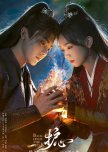
Back From the Brink
90 persone hanno trovato utile questa recensione
How to train your dragon koi.
This rom com xianxia is a barrel of laughs. It is about an ancient spirit dragon Tian Yao who falls for the wrong woman, a rancid Taoist harpy called Su Ying. She steals the guileless Tian Yao's heart and scales at the altar, dismembers him and stashes his core magical parts in different directions. A shadow of his former self, he encounters a dauntless, money loving, ousted Taoist disciple Yan Hui. They form an uneasy alliance that subjects the embittered Tian Yao to the indignity of becoming her demon familiar, a dragon koi. His plight wins Yan Hui's empathy and she vows to help him recover his shards. She soon discovers that learning how train your dragon koi is an arduous and dangerous task. Despite his deceptively benign appearance of an odd hybrid of koi, deer, pony and dragon, Tian Yao is a very dangerous creature. Apart from having deadly taste in women and friends, he also has a nasty habit of stabbing first and asking questions later.The interference of a mysterious shadow cupid Bai Xiaosheng comically advances their romance until the enabler turns into an obstructor. It is pretty much three's company as they go on many adventures, picking up lifelong friends along the way. Despite some run-of-the mill xianxia tropes and cardboardl villains, the friendships and adventures shine and are the high points of the drama.
Zhou Ye again proves her mettle as one of the most promising young actors out there. Her Yan Hui is spellbinding. She infuses the role with that effervescent joie de vivre and passionate idealism of youth that inevitably eludes older, perhaps lovelier and more seasoned actors. She looks shockingly good with Hou Minghao, whose acting is to say the least, a work in progress. But dang, he is so drop dead gorgeous that I barely register that he looks constipated at the most inappropriate moments. In some ways, his casting is brilliant as a rather uncomplicated and overly good character that loves and hates with equal ferocity. After all, dragons, kois, ponies, deers are all creatures with bigger hearts than brains. So he does some really (let's admit it) not smart things but he is so pure hearted it's almost impossible to fault him. Notwithstanding some acting rough spots, this splendid pairing had me rooting hard for them all the way.
As for the plot, its biggest criticism is that it strays from the original beloved novel in some unforgivable ways in terms of both Yan Hui and Tian Yao's characterisations. I didn't read the novel so I won't opine on that. What I can observe is this drama hooked me from the start despite the low budget and the somewhat cartoonish CGI with phenomenal storytelling. I loved Bai Xiaosheng and found him to be a wickedly good accretive addition to the original story. Unfortunately, about halfway through the characterisations of Bai Xiaosheng and Tian Yao take an abrupt nosedive. It is as if a different writer took over and defaulted into the worst, laziest tropes out there. Although the narrative recovers from a massive hiccup in the middle, it falls well short of the beginning momentum. The writer failed to capitalised on such a fresh and unusual character such as Bai Xiaosheng and turns him into a tired trope that gets sidelined toward the end. Nonetheless Wang Yilun is hugely entertaining in this role and though not as pretty, he is incredibly charming and out acted Hou Minghao. As for how Tian Yao's character is assassinated, I have no words and although he more or less redeems himself, I wish they had not gone there. I am told Yan Hui is also diminished in this adaptation but as far as I am concerned, she is perfect in her imperfections. She elevates Tian Yao to the extent, that I can forgive his character's stumbles in the middle.
While I enjoyed this drama from start to finish, there are too many shallow sub-plots in the latter half and the theme of love obsession is over-exploited. The ultimate antagonist had repetitive indifferently narrated motivators that while hateful enough, lacked depth and complexity. In fact, Su Ying was a more interesting villain than the final boring mastermind who is just beyond meh in terms of motivation, acting and complexity. Overall, this is a humorously told story that re-hashes well explored xianxia themes with no profound new revelations. Indeed the underlying substance, emotion and message of the original works is perceptible but is neglected and abused in the telling. I had big fun and many laughs with this drama but I can see how it missed the opportunity to be a whole lot more and can only rate it 8.0/10.0. I may have gone with an 8.5 had they rolled out Hou Minghao in that spectacular white wig earlier on in the drama.
Questa recensione ti è stata utile?

Reunion: The Sound of the Providence: Season 2
19 persone hanno trovato utile questa recensione
Lightning doesn't strike.
Season 2 picks up where Season 1 left off with Wuxie and Xiao Bai leaving Warehouse 11 and assembling a team to journey on to Thunder City. At this point Wuxie is desperately ill and it is not clear whether he will survive long enough to get closure on what happened to Wu Sansheng and unravel the secrets of the Thunder God. This season is better paced and more tightly written, avoids the digressions characteristic of Season 1 and comes to a satisfying conclusion. In this journey, Wuxie learns to live life in the present moment and appreciate the people around him rather than chasing mirages.Unlike Season 1, this season is a lot less about the Iron Triangle. Although we see them and their rapport and witty banter remain the most memorable highlights of the drama, this would be more aptly titled Entrourage rather than Reunion. The issue is that too many members of the team that travels to Thunder City only have modestly well developed relationships with Wuxie and/or Xiaobai but are pretty much strangers to each other. So when they are thrown together in suspenseful or dangerous situations, there isn't that very enjoyable natural chemistry or seamless bond that emanates when the Iron Triangle is together. The only execptions are Xiao Bai and Liu Sang and possibly Hei Yanjing so things markedly improved towards the end when all the "extras" get left behind.
The other enjoyable aspect of this season are that we have two very good villains - Boss Jiao and the spy and one excellent grey character Jiang Zisuan. In fact I would say they somewhat stole the limelight in this season. I was particularly impressed by Wu Lipeng's portrayal of Wuxie disguised as Jiang Zisuan. He literally knocks off all of the little mannerisms and micro expressions of Zhu Yilong's Wuxie to a T. However, it goes on for way too long and to the point where it was no longer even logical from a plot point of view. So the season ends with this feeling that Zhu Yilong/Wuxie was missing in action toward the end. This is particularly disappointing because in the final arc, I expect to see the "real" Wuxie cunningly out maneuvre and confront the last villain. Instead, he pretty much just rocks up for the final two "real" episodes. Even though Zhu Yilong/Wuxie returns for that final showdown, it has a hollow and anti-climatic tone to it, as if he is not fully in character.
Although this season progresses at a much better pace without the marked ups and downs of Season 1, I actually still find both Sea King's Tomb arc and Warehouse 11 arc of Season 1 superior to both Thunder City arc and Imperial City arc of Season 2. That is not to say these arcs are not well done, they truly are but they just were not as dangerously thrilling or mythically suspenseful - I did not feel my heart in my throat the way I did in the first arc of Season 1. This is probably because the Iron Triangle is somewhat overshadowed in Season 2 and it is hard to care as much for the entourage cast. I was praying for the Iron Triangle's survival every moment of the Sea King's Tomb arc. That does not happen in any of the Season 2 arcs - in fact if anything it seems a bit too easy. So despite its overall better cadence of storytelling, Season 2 feels like the thunder rolls but lighting doesn't strike. Thus, I rate both seasons a very enjoyable 8.5 for very different reasons. I separately reviewed Season 1 in greater detail.
Questa recensione ti è stata utile?

Remember us and all we used to be.
After One and Only stabbed me in the heart, I needed justice, I needed closure and most of all I needed to hear Shi Yi say "Zhousheng Chen, remember us and all we used to be." Theirs was such a splendid, intense love with so much passion and yearning that could not run its natural course. Sadly, after being restrained for ~5000 years, all that is unleashed are faint echoes of the past. Thus, my final impression is that what was, is never again.What this is, is a very sweet, very ordinary, reasonably touching but hardly memorable love story that is markedly lacking in intensity. It falls down hard in its failure to connect the characters of the past with the present. Aside from appearance, both Zhousheng Chen and Shi Yi could be entirely different people and this an entirely different drama. Of course in the present, they will be different but there must be that je ne sais quoi, that certain aura that lingers. Even the essence of their relationship changes, in fact it regresses. Shiyi and Zhousheng Chen of the past were of one heart and mind - she gifts part of her dowry to pacify Nanxiao and accepts her marriage hoping to reassure Zixing of her Prince Nanchen's loyalty. Shi Yi of the present asks no questions, she just trusts Zhousheng Chen absolutely without understanding his family's background or his plans. And he tries to protect her without telling her anything - it is the one thing about him that bugged me in the novel and it is the one thing they should have but did not change! As such, the sense of them being soulmates that are connected on a level beyond words is not there.
Ren Jialun and Bai Lu are both very solid actors with good enough chemistry that I genuinely enjoyed the good (pink moped), bad (lame kiss) and ugly (I am ready) of their moments together. Overall I enjoyed Ren Jialun's endearing portrayal of the shy, awkward and introverted professor whose world goes from revolving around uninhabitable planets to revolving around Shi Yi. That said, there were some truly cringe moments and he often came across as having no fire in his belly, likely due to his heavy sighing and lethargic, monotonous line delivery. I must praise how even though it took awhile, they fell into a much more natural rhythm as a couple in the last quarter of the drama and I was moved by how they grieved together and consoled one another. So despite some initial hiccups, there is genuine relationship development and that aspect finishes strongly.
The main issue with this drama that it lacks both plot and engaging and complex supporting characters. Everything really revolves around the two main leads and their romance, which moves too slowly and uneventfully to really anchor the drama. Besides Uncle Lin and possibly Mei Xing, none of the supporting characters are that likeable or empathetic. Zhousheng Chen's stepmother is the only truly complex and interesting secondary character, everybody else including the villains are rather two dimensional and the two cloddish servants are downright annoying. The plot is for the most part suspended in favour of the romance before it rushes through to the end. It is also rife with somewhat melodramatic rich family tropes from greed and envy to infidelity.
If One and Only is slow burn, Forever and Ever is like watching paint dry by comparison because there is no burn. I had to entertain myself by speculating on who got reincarnated into who and looking for hidden clues and traces of the past while mourning the fact that I was not going to see Zhousheng Chen reborn as a present day sexy beast. Which begs the question: considering how tortuous One and Only was, should Forever and Ever be watched as a standalone romance? Well, without the backstory, this is just about how an absolutely gorgeous but likely slightly delusional voice dubber falls head over heels in love with a fictional ancient drama character Prince Nanchen. She throws herself at a complete stranger; a nutty, loner of a professor with the same name who is a bit slow on the uptake but eventually realises he just got very, very lucky and thus the story unfolds. If that works for you, then by all means, skip the heartache that is One and Only.
I only watched this because I was looking for Prince Nanchen and Eleven. Sadly the future is but a mere shadow of the past. But still this is a sweet, well acted love story so I am not throwing rocks at it or at the actors. Nonetheless, this sequel did not live up to its potential so I can only rate it a 7.5. I would give both dramas together a 8.0-8.5.
Postscript:
For those of you who still need closure, there is a very well fan made alternate ending ending for One and Only produced by industry professionals. I have fan subbed it and hidden it as a spoiler in the comment section of my One and Only review.
Questa recensione ti è stata utile?
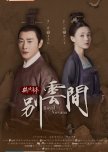
Royal Nirvana Special
27 persone hanno trovato utile questa recensione
Its in their nature.
I almost didn't watch this. Although many plot threads were left unfinished, I could accept the way they left things for the main protagonists. Why not leave well enough alone? Because I still wanted to know if how things play out with Gu Fengan, Prince Zhao and Xu Changping and who does not want to see more sweet moments between Wenxi and Dingquan?There are some unexplained time gaps but these last 12 episodes are surprisingly well edited and neatly tie up all of the remaining important plot threads. What I like best is that the villain is really good, probably the best one in the entire story and he is taken down by the person he least expects. The plot is also not too convoluted nor overly mired in excessive detail so I found it easier to follow. I am also quite impressed with Zheng Yicheng's portrayal of the more mature Gu Fengan - this promising young actor needs to take on more complicated roles like this.
What remains painful is the relationship between the crown prince and the emperor - it evolves and yet is still the same. Its like watching an unstoppable force meet an immovable object. Neither can help themselves, it is in their nature. The crown prince is an amazing, uncompromising idealist with a big heart and the best of intentions but he is also a most unsuitable person for the job. He is the one person in the entire story with no free will. Everyone, including his soul mate Wenxi tries to force his hand. The outcome is inevitable and frankly, a relief.
I am glad that with this, I watched the show in its entirety. If you have already watched the first 60 episodes, I don't need to remind you that this is a beautifully written but heavy, depressing story. It is a strong finish, I give it a 9.0 although if I have to rate the drama in its entirety it is still an 8.5.
Questa recensione ti è stata utile?

Who is the big bad wolf?
This is a passionate fantasy fairytale that unflinchingly explores the thin line between love and hate and many emotions in between with a dark intensity that will not appeal to everyone. Hidden within this dark, at times ugly complexity is a simple, intense mythical love story that is beautiful in its fleetingness.Once upon a time, Xing'er, the lonely young daughter of a feudal lord befriends Langzai, a wild orphan boy raised in the forest by wolves. Even before they understand what it means, they fall in love and form an unbreakable bond. But after a terrible misunderstanding, Langzai is whisked away by the tyrannical, paranoid and evil emperor Chu Kui who weaponizes him. When they meet again, Langzai is the fearsome Prince Bo, a ruthless, lethal military leader who keeps the mad, bad despot's internal and external foes in check. And Xing'er has grown up to be the beautiful Princess Ma Zaixing, a pawn whose family's military might is coveted by both Chu Kui and the rival Jin king. A damning accusation, divided loyalties and duty forces them to be mortal enemies and opposing forces push them towards what appears to be mutually assured destruction. Can true love uncover the truth that can defeat the darkness in their souls and free their land from evil?
This drama is not plot driven; the story is easy to follow with a few well conceived mysteries to be revealed but the villains are known from the outset and there are no shocking twists. It is very well paced and the action and battle scenes are ferocious, brutal and gripping. Rather it is largely a character driven drama where the main protagonists fight for who they choose to be and who they want the love of their life to be. It asks the question - who is the big bad wolf or who are the monsters? Is it the wolf in wolf's clothing or the wolf in sheep's clothing?
This character drama is made especially memorable by the many well cast and compellingly delivered roles. They are difficult roles to convey because all of the main characters are flawed and they all have inner animal avatars. When they are tempted or threatened their most primitive instincts emerge and we see both their best and worst selves. To properly appreciate this drama, it is important to keep this in context because the writing does not try to sugarcoat or suppress these traits, instead it gives them free rein to build into raw moments of enraged conflict, unimaginable pain, dark passion, misguided loyalty, pure love and violent hatred. All of the characters make mistakes both selfish and well-intentioned mistakes with heartbreaking and irreversible consequences.
The styling and costumes of the characters are designed to accentuate their inner animals and each of them are written to highlight their inner animal's associated personalities and strengths and weaknesses. We know that Langzai/Bo Wang (Prince Bo), the titular character is a wolf. Xing'er/Ma Zaixing is a butterfly, the least complex, most single minded character of them all. Ji Chong is an eagle and Bao Na is a horse. Yao Ji, the most underrated character in this drama is an enigmatic, treacherous and wise snake (I think). Her relationship with Bo Wang is the most surprising, complex and interesting relationship in the drama, much more so than both Bo Wang and Ji Chong's relationship with Xing'er. I wonder how many supernatural abilities these characters were originally endowed with before the censors erased all of that stuff.
The following is a deeper discussion of the main characters and their relationships that inevitably contains mild spoilers. You can stop reading here and come back to the rest after you are done with the drama.
I initially mistook Xing'er for a frustrating character - weak, naive, unwilling to grow up and one dimensional. But that is her nature - she is a butterfly - a delicate, transitory being that is a symbol of youth, joy, love and beauty. Female butterflies mate only once and then they die. Her goals are simple and she is pure hearted but she is by no means weak; on the contrary she is single minded and unyielding in her love for Langzai and her determination to recall him from the darkness that is Bo Wang. Her heart is gently cruel in its lack of capacity to to let anyone else in. This kind of role is both very easy and very difficult and Li Qin pulled it off phenomenally (despite a shrill and atrocious voice dubber). I could feel her pain and disillusionment and teared up as I watched Xing'er innocence and love of life get extinguished into the strong, mature, revenge driven but indifferent Ma Zhaixing.
Bo Wang is a sexy, magnificent, conflicted and tortured beast of a character that I loved to hate in the beginning and hated to love at the end. He is the big bad wolf, a ruthless predator with savage methods but he is also highly intelligent, passionate and devoted to his pack or his family. Wang Dalu's portrayal is so vivid and potent that I could see a wolf lurking behind Bo Wang's every facial expression and gesture - I can't believe I have never watched this actor before. The scorching chemistry between Bo Wang and Xing'er is the most outstanding feature of this drama. Both actors have such intense screen presence that anyone that shares the screen with them becomes invisible. Their passionate, tormented kisses and the intense longing in their gazes give lie to their often toxic verbal exchanges. Their relationship scales the tortured depths of hatred and despair to the breathtaking heights of love and ecstasy. They are so convincing and moving as a couple that all of their love rivals pale in comparison.
Ji Chong is an eagle, a bird of prey that can see the big picture from high above and swoops down opportunistically and tactically to force the lovers to face each other as mortal enemies. Like Bo Wang, Ji Chong also tries to save Xing'er by changing her; in this matter he and Bo Wang have a common agenda. While their methods are diametrically opposite, the outcome is the same in that they both cause her to suffer enormously. Bo Wang pushes her away harshly and cruelly while Ji Chong albeit charmingly, imprisons her with duty and obligation to her clan. Bo Wang loves her enough to give her up but Ji Chong more selfishly and somewhat naively tries to wheedle and manipulate his way into her heart. Ji Chong and Bo Wang are both ultimately well intentioned but make many mistakes and are thus equally responsible for all but erasing the Xing'er they love. I am very impressed that Xiao Zhan chose to play such an interesting, endearingly immature and flawed second lead rather than yet another insipid and suffocatingly noble and selfless one. Just as with his iconic interpretation of Wei Wuxian, Xiao Zhan's blinding charisma compels us to forgive Ji Chong's flaws and weaknesses and even empathize with him.
Surviving to exist is not important to Xing'er who only cares that she rescues her Langzai so that they can retreat into the forest away from the two legged monsters that walk the world outside. With this in mind, the drama's ending is not just good, it is also fitting. As someone who loves such beautifully flawed and even dark characters, I find Xing'e and Langzai's mythical love story to be unforgettable so this has to be a 9.0 possibly even a 9.5 for me. I can understand why others may find the themes too darkly disturbing and judge the characters much more harshly.
I will end with a nursery rhyme I vandalized for @sony_t:
Wheedle eagle, pudding and pie,
Kissed the butterfly and made her cry,
When the wolf came out to play,
Wheedle eagle flew away.
Questa recensione ti è stata utile?
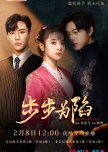
When you order prime rib and get spare ribs instead.
I expected Youku's short "Revenge" series to be a xianxia in disguise featuring the many hot re-incarnations of "The Best-est of the Chest-ests" Dai Gaozheng in all his topless smoking hot glory. If that is also what you are here for, let me save you some time because Bride's Revenge is nothing but chest bait. In this incarnation as Mu Anhe, Dai Gaozheng is over-dressed and so camera shy he is in hiding for over a third of the drama. When he reappears, it is uncomfortably obvious there is no spark between the leads. While their chemistry is sweet and loving, it notably lacks the passion and intensity of the previous incarnation.The plot is uncannily similar to Maid's Revenge where two related men Mu Ancheng and Mu Anhe duke it out over the family assets and a woman. Except this time a bunch of "green tea bitches" scheme, bitch slap and scratch each others' eyes out over a scrawny and unappetising scumbag. That entire arc of not very smart people trying to out dumb each other made ten minutes feel like an hour. Even a happy ending cannot save this drama. The dissatisfaction level is just like when you order prime rib and get spare ribs instead. Give this one a pass unless you are super bored and need a quick Dai Gaozheng fix. And in that case, just watch the last three episodes or better yet, rewatch Maid's Revenge.
I generously rate this 3.0/10.0 because Dai Gaozheng is still the chesty definition of hotness.
Questa recensione ti è stata utile?
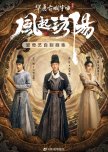
Wild goose chase.
Ancient conspiracy thrillers are right up my alley so I looked forward to Luoyang with bated breath. This is set in Shendu (now Luoyang), capital of Wu Zetian's Wu Zhou Dynasty (690-705). As the only female emperor in over 5000 years of Chinese history, Wu Zetian remains a controversial figure - an ambitious, usurper whose exceptional intelligence and leadership is only matched by her ruthlessness against anyone in her way, including or especially her own children. She cultivated informers and multiple secret police and spy rings that gathered evidence against her detractors. and maintained a careful balance of power between the important political structures of her administration. This is reflected in the drama in the clear delineation of responsibilities between the Judiciary, Inner Guard and Secret Police (Lianfang). During this time, the Wu clan and Li clan were embroiled in a power struggle which persisted until Wu Zetian intervened and clarified her succession plans. Nonetheless it ended in messy plotting, betrayals and twists that are drama worthy in and of themselves. This is rich fodder for conspiracy plots such as this one.The drama starts thrillingly with a bold daylight assassination of an informer and his daughter and the ensuing dizzying high speed chase through the streets of Shendu. All three main protagonists mortician Gao Bingzhu, foodie Baili Hongyi and inner guard Wu Shiyue are at the scene and invisible threads from their past pull them together to uncover a much deeper conspiracy that could rock the very foundations of Wu Zetian's empire. Clues emerge that connect seemingly unrelated cases and force the three protagonists to work together, at first reluctantly and with selfish agendas and then with growing mutual respect and trust that blossoms into deep friendships. I most enjoyed the tripartite friendship in the drama and would have liked to see it better explored rather than unnecessary romantic arcs. Huang Xuan nailed it with his cynical yet paradoxically idealistic Gao Bingzhu; whose shrewdness and insight into dark hearts of man does not extend to those he cares for. I also did not see much chemistry between him and Song Qian who impresses with her fight scenes but falters somewhat in her line delivery. Wang Yibo's performance is strong in some aspects but uneven overall with too many scenes where he is clearly unsure what facial expression to wear. This role does not elevate him for me from an actor that I don't mind watching but wouldn't seek out. That said the trio has enough combined chemistry that I am happy to watch them together again. As for Song Yi, she has gotten enough flack and her character was so poorly written that all I will say is this is a role such a wonderful actress should have just passed on.
I did not enjoy the first two episodes of the drama - too much was happening at the same time and the cameraman swung the camera so wildly I thought he was possessed. The action scenes are exciting and well choreographed enough they did not need to artificially augmented by cheap camera tricks. After the psycho camera settles down, the plot unfolds at an intense and exciting pace against a gorgeous backdrop of dazzling sets and with a deluge of colorfully garbed denizens - they must have hijacked and costumed practically every Hengdian tourist as extras on set I have never seen so many people crammed into each scene. My personal favorite set is the Unwelcome Well which looks almost too inviting to be a ghetto. While the costumes and certain props are anachronistic, everything comes together is such a vibrant and captivating panorama that it scarcely matters. This is complemented by well designed side characters that are based on well known historical figures. Hints of their personalities, scandalous affairs and alliances are quite faithful to history and add a nice ambiance to the setting. It set up for intriguing Dumas like plot twists that didn't materialize.
This drama builds to a top-notch, shocking and heartbreaking climax prematurely at episode 20 where both actors delivered standing ovation worthy performances. It achieves that perfect sequence of shock followed immediately by stunned comprehension and acceptance as all the clues rushed to the fore to blindside the viewer to the next unfolding twist. In the second half, the plot visibly loses momentum and digresses into romantic arcs that don't belong in this genre and filler maudlin flashbacks. The writing of the mini-threads in the second half is insipid with excessive gratuitous character implants, many of whom delivered cringe worthy performances.
In hindsight it would have been difficult to top the fantastic mid-drama climax but it is still extremely disappointing for the final reveal to be so bland. The hollow villain that everyone was on to as a bad guy early on but dismissed as too obvious turns out indeed to be the final villain, one that is not worthy of being called a mastermind. Both their motive and end game plot is not well articulated or convincing. Multiple clues and more interesting suspicious characters that don't play out leave me feeling like I went on a wild goose chase. I don't know if they ran out of money or wasted it on too many bodies but there is no sense of peril or excitement in the final showdown. Forget explosions or collapsing buildings, we don't even get one good last fight scene. The final insult is how unfathomably a feather brain like Liu Feng manages to find himself in the right place at the right time to deliver an unnecessary and uncalled for outcome. This is just a misguided attempt to deliver an audience shocker to make up for the nothing burger of a final reveal.
Even though this remains a very entertaining and highly recommended watch, the ending is a big let down that knocks 0.5 off my final rating for the show. I feel that an 8.0 is the best I can give to this show, which is still one of the better c-dramas of the second half of 2021.
Questa recensione ti è stata utile?
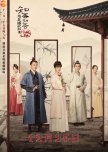
The Story of Ming Lan
22 persone hanno trovato utile questa recensione
A cacophony of crows.
The Story of Minglan is a leisurely and meandering account of how with patience and cunning, Sheng Minglan, the low born daughter of a concubine triumphs over many challenges to achieve both personal and social success. Minglan's father is a middling court official who over indulges his favorite concubine and allows her to turn his household upside down. The petty tyranny of harem rivalry leads to tragedy and Minglan ends up being raised under her grandmother's wing. Minglan's great misfortune has a giant silver lining because this formidable old lady is a force to be reckoned with. She sees to it that Minglan is well schooled and helps her navigate the many pitfalls of harem politics. Minglan blossoms into a quietly underestimated young lady who catches the eye of the most eligible bachelors despite her low status.This drama digs deep into what lurks beneath the genteel façade of Confucian propriety among the status conscious Song dynasty nobility. The deceptively sedate, mundane, humdrum of women living lives of quiet desperation, occasionally broken by shrill outbursts that crescendo horrifyingly in a cacophony of crows. My eardrums barely survived the assault of this panoply of nasty, caterwauling women. The early arcs on Minglan's childhood and coming of age are the best, most empowering ones. The drama climaxes at her vengeance arc, where I found her quiet scheming and utter ruthlessness chilling and impressive. After that the domestic bliss arcs drag on far too long with the couple dealing with repetitive villains with all too similar modus operandi. We really did not need to see version 2.0, 3.0 etc of essentially the same not very smart wicked women archetypes that are too handily dealt with by our power couple.
Zhao Liying delivers a credible portrayal of a docile, Song dynasty noblewoman with hidden depths. The way she digs into you with her eyes, the fleeting cunning smirk and brief flash of fury in her placid gaze foreshadows her evolution into a full-on temper tantrum throwing wife! That said, Zhao Liying is still best at fierce roles rather than as a docile still waters run deep kind of character. Zhao Liying and Feng Shaofeng paint the perfect picture of domestic bliss.Their chemistry is that of a long married couple in harmony and less of the sizzling kind that flared up between her and Lin Gengxin in Princess Agents. It is rare to see Zhu Yilong in a costume drama and I felt real sorry for his Qi Heng who unlike both Gu Tengye and Sheng Minglan, has no free will as he is unable to free himself from the social strictures of his time. The cast overall is very strong with many veteran actors that deliver comical parodies of the ridiculous pretensions of the Song aristocracy.
I am afraid I did not enjoy this very well made drama as much as many other people did. The 70+ episode narrative goes on for too long, conveying an unnecessarily realistic impression of how suffocating it was to be a Song dynasty woman. Considering Gu Tingye's incredibly modern attitudes with respect to polygamy and empowering his wife, I am convinced it was impossible to be a Sheng Minglan in those times. Some of the early arcs are worth 8.5 but the story climaxes too early and is bogged down by repetitive plots in the latter half. This weighs my overall rating down to 8.0. This is a drama that patient viewers with robust eardrums will enjoy more.
Questa recensione ti è stata utile?

Hope is not a strategy.
The Hope is the Chinese adaptation of a Japanese manga Dragon Zakura about an unconventional teacher who takes on a class of underachieving students. While I haven't watched the Japanese television version, this Chinese adaptation has clearly been heavily localized even though it retains a manga-like flavor in certain characterizations and comedic sequences. This drama critically examines the Chinese education system and its strong emphasis on the all-important Gāokǎo/高考 nationwide college entrance exam which takes 9 hours over two or three days. In a nation of largely single-child families, nothing is more important than getting their only child into the college of their dreams. With over 10mm taking the Gāokǎo each year, the competition is intense. Even though the pass rate is very high (85-90 percent), a minimum score of 600 (out of 750) is needed to gain acceptance to the most elite universities. Less than 7pct of students are accepted at these top universities and the acceptance rate at Qingbei (Tsinghua University and Peking University) where the crème de la crème matriculate is less than 0.1pct.After a series of entrepreneurial setbacks, star lecturer Lei Ming returns to teaching. He teams up with Sang Xia, a psychology teacher on an experimental program to turn around students that are not living up to their potential. His handpicks five students for his experimental Class 11; an orphan Li Ran, a math whizz Cheng Yushan, an aspiring rapper Jiang Qinglang, gossip girl Bian Xiaoxiao and the browbeaten Yu Yang. With Gāokǎo just a year away, his lofty boast of getting all five of them into Qingbei is widely ridiculed. His biggest skeptics are the students themselves and Sang Xia. His methods though unconventional are hardly trailblazing; much of it involves tried and tested methods used by successful students including time management, minimising distractions, identifying focus areas and being tactical about selecting courses. The drama makes it clear that hope is not a strategy and that while there are smarter, better ways to study, there is just no way around putting in the hours.
This is an exceptional drama that makes a poignant and compassionate case for students who have fallen behind. It exposes how they are failed by an indifferent sink or swim kind of education system. Each of the young actors does a fantastic job portraying their hardships, self-doubt and how they discover their best selves in their struggle against overwhelming odds. I don't have a favorite among them because they all have their own special talents, their own crosses to bear and blossom in their own ways as they learn to take ownership over their own destines rather than just being victims of circumstances they can only change at the margin. Lei Ming and Sang Xia are like fairy god parents who can help but can't make their lives perfect. Rather, they impart upon them the invaluable gift of learning how to cope and the ability to feel compassion for others. This is seen in how the understanding they show poor little rich boy Shen Yao and Lei Ming himself when he lets them down. In saving them, in many ways Lei Ming saves himself.
As for Zhang Ruoyun, he once again shows his uncanny ability to pick fantastic scripts. As always, he leaves so much runway for his young co-stars to shine and lets this story really be about them without defaulting into simply being a plot device. Because his Lei Ming is far from perfect; he is cynical and beneath his confident facade, deeply damaged by his resentment of his father, the great teacher Lei. In helping Class 11 in their struggles with Gāokǎo and their personal devils, he gains perspective on his own journey many years ago and gains some understanding of his father. My heart was in my throat watching Zhang Ruoyun portraying this role so movingly in light of his own difficult relationship with his father. Probably largely due to Zhang Ruoyun's powerful charisma, I found Sang Xia's constant baiting and argumentativeness to be pompous and super annoying initially. But she grew on me and I came to appreciate how their relationship actually thrives on calling each other out and challenging each other to do better.
This drama for all intents and purposes ends at episode 29 and it is fine to just stop there. The episode 30 "twelve years later" epilogue replaces the young actors with older vague lookalikes. That broke my connection with the young actors that I grew to love so much. I didn't mind the sober tone of the epilogue. It delivers the right message that there are no absolutes in life; that even Qingbei is no guarantee that all's well that ends well. The biggest lesson learned, the one that stands the test of time beyond all the academics is about coping with life's ups and downs. And they are still young enough that the whole world still lies ahead of them so their journey continues. My biggest issue with it is I had hoped for better for Lei Ming. But I guess that is what makes this drama so special; this ability of to be so incredibly inspiring yet so unbearably realistic at the same time. If you wish to skip the realism, then call it a day at episode 29. It still falls short of a fairytale but at least there is an abundance of hope.
This is a highly recommended and very memorable watch that I enthusiastically rate 8.5/10.0.
Questa recensione ti è stata utile?
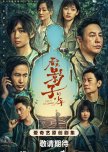
Kan Bu Jian Ying Zi De Shao Nian
18 persone hanno trovato utile questa recensione
Lost and Found.
Set in the 1990s, this is a riveting suspense thriller about three teenage boys who go missing on a dark and stormy night. Three years later, Xiao Qi, a pick-pocket is caught and identified as one of the missing boys. He is reunited with his grateful family but he does not seem quite the same and claims to have little memory of what transpired three years ago. This revives the investigation of the old case, with Wang Shitu leading the investigation. His investigation shines a spotlight on human trafficking rings. His search is painful and personal as his son has been lost for more than a decade. As the investigation advances, he gets to know Xiao Qi and the Jin family and more questions emerge as to what really happened that fateful night.This drama does a terrific job building suspense, planting the seeds of many credible explanations with each frightening new reveal. Mystery buffs will enjoy trying sorting through all the lies to pull all the pieces together. The first villain's confession however was not convincingly obtained and that case is too hastily tied up to focus on the final villain. There are too many confessions obtained using this same threat of shaky evidence against a loved one. Even though a shadowy image of the main villain and what must have happened emerges early on, the cat and mouse of pinning them down is riveting. This is one of the most layered, selfish, manipulative and just plain evil sociopaths I have seen in a long time. What is truly scary is their motive is vile but understandable; that this is easily something someone, anyone is capable of doing simply because they want what they want badly enough. The final solution however is somewhat anti-climatic; there are many more interesting ways this could have played out. There are also a fair number of plot holes and loose ends.
The strongest and most moving aspect of this narrative is not the mystery but the relationships that evolve around it. The mother and the father who lost a child and the unimaginable and continuing pain that they endure. And the lonely boy that was lost and found, and how through all this mess they somehow manage to heal a small part of each other. With this kind of cast, I don't have to praise the acting. Zhang Songwen and Rong Zishan's chemistry is well established and as expected, they deliver in spades and make me root for them every step of the way. But the most surprising and distressing performance is Guo Keyu's portrayal of Bian Meizhen's confused longing for her lost child and her devastating moments of awareness.
Overall, the mystery plot is good but does not live up to its early promise and is not as tight as could be. But the character arcs are superbly done and the ending is perfect and brilliant in the most realistic of ways. This is a highly recommended 8.5/10.0.
ENDING SPOILER COMMENTS
Doudou was a red herring from the start and considering the theme of this story is lost children, it is no surprise that there is no fairytale ending. Nonetheless, Wang Shitu does not give up and continues to look. This kind of story is not easy to write or to end in a way that acknowledges and respects the suffering of victims of child trafficking. Jin Manfu is the manifestation of what must be every parent with a lost child's worst nightmare. But this story also reminds us that there are Wang Shitus and Bian Meizhens in this world who can still open a corner of their hearts. And that maybe they can also find some solace by opening a small part of their hearts. The only small bone the drama throws the audience is Doudou probably ended up in a family with a dog and where he is much loved and may one day still be found.
X
Questa recensione ti è stata utile?
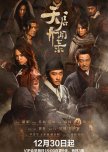
An Oriental Odyssey.
Chu Sijing, a captain of theJinyiwei/锦衣卫 or Embroidered Guard is on a mission to investigate a strange epidemic that broke out on the remote Wumu Island in Liaodong province. The outbreak threatens the adjacent NInghai Fortress, a critical stronghold against the invading Jurchens. The powers that be have their own agendas and appear more interested in covering up the outbreak than anything else. Thus Sijing steals onto the island aided only by a Mongol Tartar official Bo Yan and a Fulangji/佛郎机 businesswoman Angelica. There he encounters mysterious, disease afflicted villagers who worship ancient Gods and is forced to deal with some monstrous truths. Can he weed out the root of the epidemic before it overwhelms them all?This story is set in the 3rd year of Tianqi, when the Ming Dynasty was in rapid decline. It was a time of many natural disasters from meteorites to a mini ice age, drought and famine. Superstition reigned high as the peasants were starving and the emperor was widely said to have lost the Mandate of Heaven. The drama invests heavily in world building and weaves in many themes from the period and fantastical creatures from Chinese mythology 山海经/Classics of Mountains and Seas and 神异经 / Classics of Gods and Spirits. Even though the CGI is not the best, I appreciate the effort that went into how they blended history, fantasy and ancient lore together to make this an Oriental odyssey.
Unfortunately all the research and creativity that went into world building is wasted on the story's plot which hints heavily at a complexity that never materialises. For such a short drama, there are too many subplots touching on many themes that go nowhere. Even ignoring Sandrine Pinna's appalling Disney cartoon character acting, the entire Angelica/Pirates of the Caribbean arc adds nothing to the story. The time would be better spent fleshing out the motives of the Henggong cult and tying up the many loose ends to the story. I usually like Huang Xuan's acting and enjoyed his chemistry with Bo Yan but this is not his best role. Maybe it is the overuse of green screens but I caught him frequently out of the moment and staring blankly into space. Shen Rang is the only character that really moved me and I enjoyed this character design and portrayal the most.
The best things about this drama are that it does try to be different, it is short, some of the action scenes are pretty good and it is oddly enjoyable despite its lack of logical consistency. The ending is anti-climatic, doesn't hang together well, leaves loose ends and is disappointing overall. I am being generous in rating this as a 7.0/10.0.
Questa recensione ti è stata utile?


 53
53 195
195 8
8




















